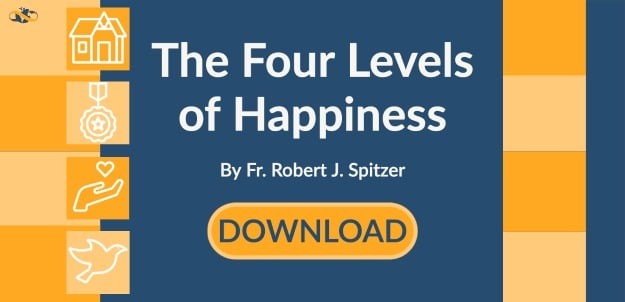There is only one way to live, and that is for others. We only become ourselves by forgetting ourselves.
Viktorl Frankl came to this realization in a concentration camp. He wrote:
“The more one forgets himself—by giving himself to a cause to serve or another person to love—the more human he is and the more he actualizes himself.” —Viktorl Frankl
This process of forgetting ourselves directly correlates with our own view of happiness. In order to be truly human, we must find happiness beyond transitory goods. We must realize that happiness consists in becoming ourselves fully. To do that, we must forget ourselves for the sake of the other. This is essential to the Christian life, as can be seen from Christ’s sacrifice on Calvary.
What Does Your Road to Happiness Look Like?
It is entirely natural to take pleasure in eating a delicacy or in receiving praise for a job well done. However, your happiness cannot only be found in fine foods and in praise.
If placed in an environment of suffering with the base view of happiness mentioned above, then unhappiness will ultimately follow. This truth led Frankl to discover that happiness must be made from more lasting things.
For example, we can find happiness in making a positive difference to someone or something beyond ourselves. We can also find happiness in doing good simply to please God.
There are three primary powers within us that help us to orient our happiness to higher things and thus become who we were made to be—empathy, conscience, and prayer.
Empathy on the Road to Happiness
Empathy is a strong power of connection or unity with another person that breaks down our barriers of autonomy and egocentricity. Empathy makes doing good for others just as easy, if not easier, than doing good for ourselves.
When we plan to use empathy to strengthen the bond between ourselves and others, we must do what Philosopher Gabriel Marcel called “looking for the good news in the other.” Namely, a person practicing empathy looks for kindness, strength, virtue, delightfulness, and transcendent mystery in the other.
Conscience on the Road to Happiness
Conscience is one of the most important human faculties. It is generally viewed as an inner attraction to goodness and an inner aversion to evil.
This powerful attraction to the good—and fear or revulsion toward evil—helps us in our relationships with others. If we are attentive to our conscience and the virtues it promotes, we will not want to hurt, harm, or use other human beings.
The more we follow the Silver Rule, “Do not do unto others what you would not have them do unto you,” the easier it will be to practice thinking of others before ourselves.
In the quote below, Christian author C.S. Lewis illustrates why conscience is a necessary companion of empathy.
“The most dangerous thing you can do is to take any one impulse of your own nature. There is not one of them that will not make us into devils if we set it up as an absolute guide. You might think love of humanity in general was safe, but it is not. If you leave out justice, you will find yourself breaking agreements and faking evidence in trials ‘for the sake of humanity,’ and become in the end a cruel and treacherous man.” —C.S. Lewis
Prayer on the Road to Happiness
Prayer is nothing more than a relationship with God. As one’s relationship with God grows, empathy for others also grows.
The more we get to know God through prayer, the more we begin to understand Him. As this occurs, we become more like Him, thereby purifying us from egocentric desires and perspectives.
Prayer also supports and enhances the natural power of conscience. An important series of studies show that religious people may not necessarily know more about ethics than non-religious people; however, they are less willing to be unethical—particularly at the moment of decision.
An Example of Empathy, Conscience, and Prayer on the Road to Happiness: Maximilian Kolbe
“A single act of love makes the soul return to life.” —Saint Maximilian Kolbe
Saint Maximilian Kolbe, a Franciscan priest, willingly entered a starvation bunker to save the life of another while in the Auschwitz concentration camp.
Saint Maximilian Kolbe spent his life living for others and met his end living for others. May he inspire you on your road to happiness by finding the best ways to live for others.


